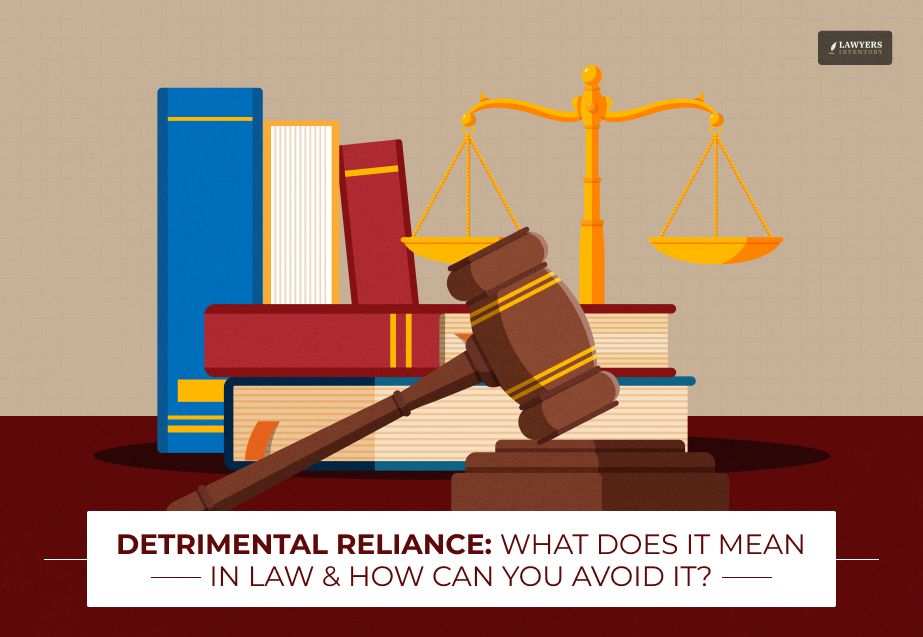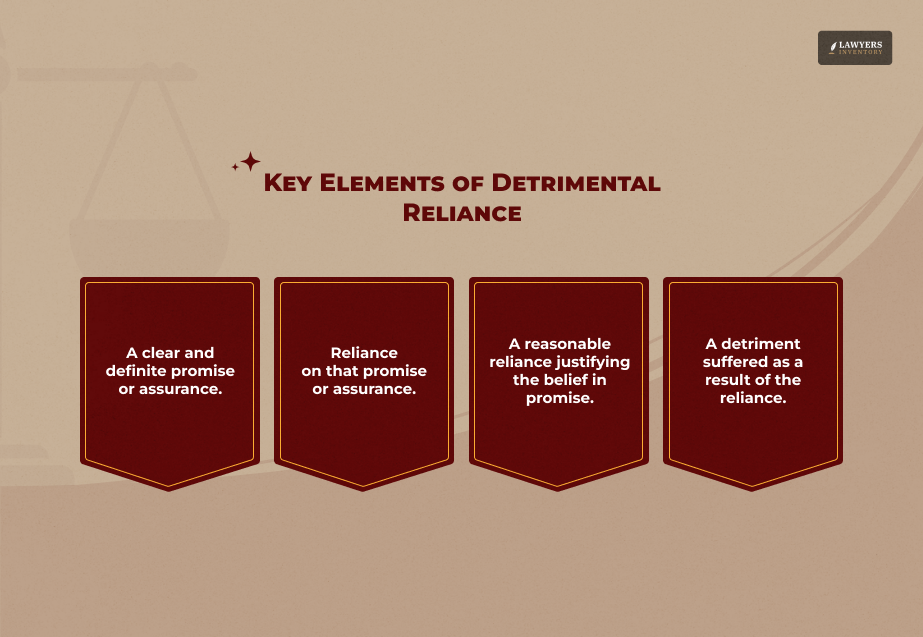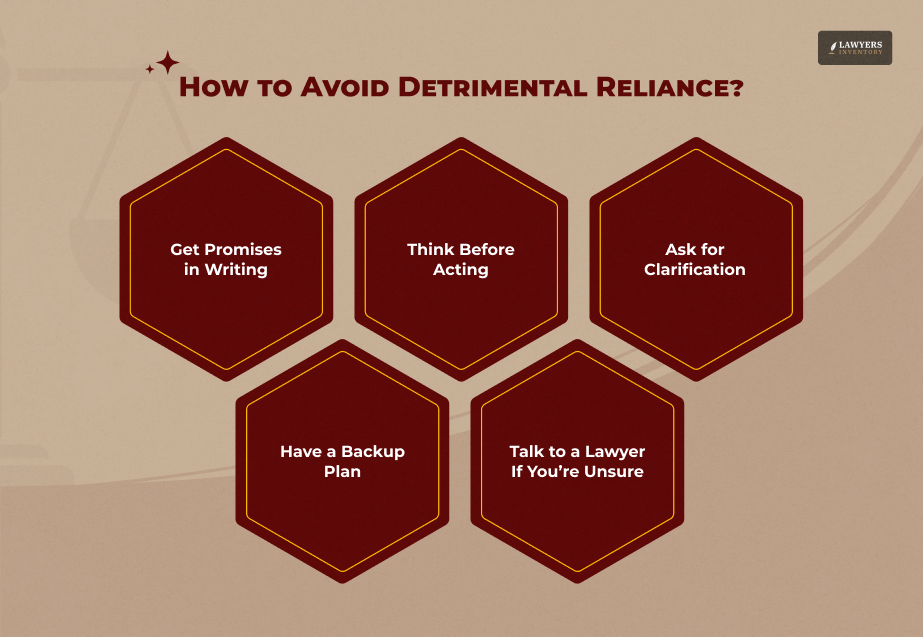
Detrimental reliance is a fancy legal phrase, but don’t worry—it’s not as scary as it sounds. It happens when someone makes a promise, and the other person believes it and makes a big decision based on that promise.
But then, the promise is broken, and the person who believed it gets hurt or loses something because of it. Now, this idea is very important in law.
“Why?”
Well, that’s because it helps protect people from being treated unfairly when they trust others.
If you’ve ever done something because someone said, “Trust me, I’ll take care of it,” and then they didn’t—this is what detrimental reliance is all about.
Hi. In today’s blog, I will explain what it really means, why it matters, and how it works in real life.
Additionally, I will also tell you how exactly you can save yourself from detrimental reliance. So, if that is what you want to know, keep on reading till the end and thank me later…
What is Detrimental Reliance?

If you have read my previous blogs, you already know that I like (read: LOVE) to simplify complex legal terminologies. And that’s exactly what I plan to do today.
So, what is detrimental reliance?
Detrimental reliance is when you trust someone’s promise, act on it, and then suffer because they didn’t keep their word.
It’s called “detrimental” because it causes harm, and “reliance” because you depended on what they said.
Let me give you a hypothetical situation: Imagine your friend promises to give you a ride to an important job interview. You cancel your backup taxi because you trust them. But they never show up.
You miss the interview and lose the job chance. You relied on them, and it hurt you—that’s detrimental reliance.
In legal terms, if someone makes a clear promise, and you change your actions or plans based on that promise—and then end up worse off because the promise wasn’t kept—you might have a case.
Courts look at this to see if it’s fair to hold the person who made the promise responsible. It’s part of what lawyers call “promissory estoppel,” which is a rule that says people can’t just break promises that others counted on.
What is the Significance of Detrimental Reliance in Law?
Detrimental reliance is important in law because it helps make sure people are held responsible for their promises when others are affected. It’s a fairness rule.
Without it, someone could say something like, “I’ll pay for your school,” and back out after you’ve already enrolled and paid—leaving you stuck with a big bill and no help.
In legal cases, courts use detrimental reliance to stop people from acting unfairly or backing out of promises that caused real damage.
It’s part of making sure the law supports trust and honesty in everyday life. People should be able to believe promises that affect their future.
Also, this rule comes up a lot in contract law—even if there isn’t a written agreement.
Sometimes, just a spoken or informal promise is enough, if it was serious and if it caused you harm. That’s why it matters—detrimental reliance can turn a broken promise into a real legal issue.
How Can You Establish Detrimental Reliance?
To prove detrimental reliance, you need to show a few things. Think of it like steps:
- A Clear Promise Was Made: The other person must have clearly promised to do something important.
- You Believed That Promise: You trusted the promise and believed it was real.
- You Took Action Based on It: You changed your plans or did something important because of that promise.
- Got Hurt Because of It: You ended up in a worse position when the promise wasn’t kept.
Let’s say your boss promises you a raise, so you buy a new car thinking you’ll afford it with the extra money.
But the raise never comes, and now you can’t make payments. If all those steps are true, you may have a case.
But be careful—courts also look at whether your belief was reasonable. If someone made a silly or unclear promise, and you still acted on it, you might not win.
The promise must be believable, and your reaction must make sense.
Example of Detrimental Reliance
Here’s a simple, real-life type of example:
Anna is a college student. Her uncle tells her, “If you quit your part-time job and focus on your studies, I’ll pay your tuition next semester.” Anna trusts him, quits her job, and studies hard. When the time comes, her uncle changes his mind and refuses to pay.
Now Anna has no job and can’t afford tuition. This is detrimental reliance—she relied on a promise and suffered for it.
In court, Anna could argue that:
- Her uncle made a clear promise.
- She trusted it.
- She acted on it (by quitting her job).
- As he didn’t follow through, she was hurt (she can’t pay for school).
If the judge agrees, Anna might win compensation or some kind of help to make things fair again. That’s how this legal idea protects people who are honest and trusting.
How to Avoid Detrimental Reliance Legally?

Avoiding detrimental reliance is about being smart with promises and trust. Here are some simple tips that can protect you:
- Get Promises in Writing: If someone makes a serious promise, ask them to write it down. A written promise is easier to prove and protect in court.
- Think Before Acting: Don’t make big life changes just because someone said something. Ask questions like: “Can I really trust this?” or “What happens if they don’t follow through?”
- Ask for Clarification: If the promise is vague, ask for details. Don’t act unless it’s clear and specific—like dates, amounts, or actions.
- Have a Backup Plan: Try not to rely 100% on one person’s word. Have another option in case the promise doesn’t work out.
- Talk to a Lawyer If You’re Unsure: If it’s a big promise—like money, jobs, or housing—consider asking a lawyer before you act. A quick chat could save you from a big loss.
Also, if you are the one making a promise, be careful not to say things that sound serious if you don’t mean them. You could be held responsible later.
Remember: Being cautious with trust doesn’t mean being unkind. It means protecting yourself in a world where things can go wrong—even if people mean well.
Read Also:
- How Long Does a Court Hearing Last in the United States?
- Steps to Take If You’re Denied Workers’ Compensation
- How Do I Claim Whiplash Compensation?











0 Reply
No comments yet.